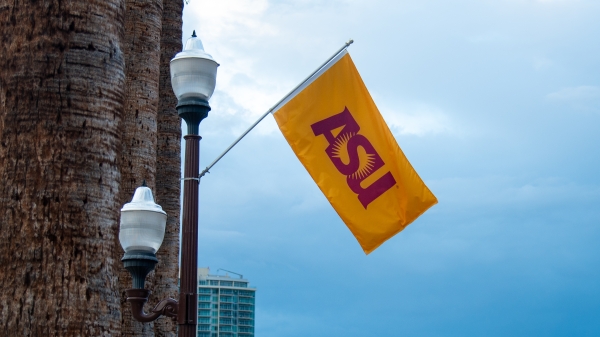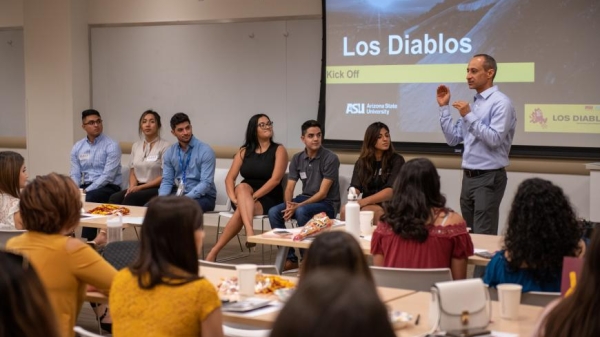ASU works with tribal representatives to fulfill Native American Graves Protection and Repatriation Act
Arizona State University is working diligently and respectfully to improve its care for and repatriation of Native American human remains and cultural items, under the Native American Graves Protection and Repatriation Act (NAGPRA).
These ancestors and belongings were brought to ASU through federal actions, such as road construction, and in support of the university’s development and educational mission. ASU works closely with federal and state agencies that also have the duty and responsibility to fulfill the mandates of NAGPRA.
“Our number one priority at the repository is living up to our NAGPRA responsibilities. We have taken concrete steps to increase our capacity for this work by substantially increasing our staff through both internal and external funds,” said Christopher Caseldine, who in 2021 became the curator of collections for the Center for Archaeology and Society Repository, part of ASU’s School of Human Evolution and Social Change.
“We are the caretakers of Native American ancestors and their belongings until they go home. Our work is guided by frequent and transparent consultation with Native American tribal representatives,” he said. “For us, consultation is a relationship built on trust.”
Under Caseldine’s management, the repository:
- Increased staffing to six full-time employees, three part-time graduate student NAGPRA associate positions and 11 student worker positions. Over 50 student interns have assisted with NAGPRA-relevant archaeological collection inventories. There are plans in the works for further expansion.
- Obtained more than $500,000 from internal and federal sources for additional employees to help support the effort, and expanded the use of ASU funds.
- Created a handbook in late 2021 to carefully and respectfully guide the university’s compliance with NAGPRA.
- Created a first-in-the-nation undergraduate NAGPRA learning track to provide training for students to learn how to lead repatriation projects.
- Created a first-in-the-nation museum studies MA program focusing explicitly on NAGPRA management that will soon begin accepting students.
ASU recognizes that it is responsible for the Native American ancestors and cultural items cared for by the repository. All three state universities are required to abide by the Arizona Board of Regents Tribal Consultation Policy (1-118), in which consultation with tribes on NAGPRA is explicitly stated. Additionally, the repository follows the guidance and oversight of federal agencies, such as the Bureau of Indian Affairs and U.S. Forest Service, for ancestors and cultural items under their legal control.
The university fields occasional requests for interviews on NAGPRA but typically declines comment at the request of Tribal Historic Preservation Offices (THPO), which represent federally recognized tribes.
“We view NAGPRA consultations as a private matter between consulting entities and tribes,” said Barnaby V. Lewis, the Tribal Historic Preservation Officer for the Gila River Indian Community. “We do not call attention to repatriation efforts. We maintain an honorable process in bringing ancestors home with dignity and respect.”
“We consider repatriation a sensitive matter, so we do not discuss it with the media or any outside entity,” said Shane Anton, the Tribal Historic Preservation Officer for the Salt River Pima-Maricopa Indian Community. “We are working closely and cooperatively with ASU on this to make sure it is done correctly and respectfully.”
The limited comments to the media do not mean that action isn’t being taken, said Jacob Moore, ASU’s vice president and special advisor to the president for American Indian affairs.
“The fact that NAGPRA is necessary speaks to the injustice related to having our ancestors in repositories in the first place,” he said. “Our cultural resource partners are not interested in a public re-examination of how we got here. Our cultural resource partners just want the work done and ancestors returned home.”
“Nationally, some higher education institutions and museums remain disengaged and unsupportive of the repatriation process. That is not ASU,” Moore added. “We are fully engaged and supportive of the repatriation process and are respectfully fulfilling the tenets of NAGPRA.”
More University news

Lester Godsey joins ASU as chief information security officer
With a career spanning nearly three decades of professional IT experience, Lester Godsey is back where he first started — serving the community at Arizona State University.As a two-time ASU alum,…

ASU a top-ranked university for graduate employability
Students usually seek higher education degrees to build their skills and aptitude in their chosen vocation, and advance their life opportunities. And Arizona State University is a good place to do…

ASU Alumni Association to honor 3 outstanding alumni leaders during Homecoming
The Arizona State University Alumni Association will proudly recognize three innovative alumni leaders during the Homecoming Parade and football game against Brigham Young University on Saturday, Nov…